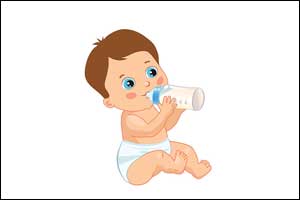- Home
- Editorial
- News
- Practice Guidelines
- Anesthesiology Guidelines
- Cancer Guidelines
- Cardiac Sciences Guidelines
- Critical Care Guidelines
- Dentistry Guidelines
- Dermatology Guidelines
- Diabetes and Endo Guidelines
- Diagnostics Guidelines
- ENT Guidelines
- Featured Practice Guidelines
- Gastroenterology Guidelines
- Geriatrics Guidelines
- Medicine Guidelines
- Nephrology Guidelines
- Neurosciences Guidelines
- Obs and Gynae Guidelines
- Ophthalmology Guidelines
- Orthopaedics Guidelines
- Paediatrics Guidelines
- Psychiatry Guidelines
- Pulmonology Guidelines
- Radiology Guidelines
- Surgery Guidelines
- Urology Guidelines
Higher fat cow-milk intake linked to lower childhood obesity, finds study

Majority of children are put on cow-milk after they have stopped taking breast milk. Children aged >2 years are recommended to consume reduced-fat (0.1–2%) cow-milk to lower the risk of obesity.
A systematic review and meta-analysis led by St. Michael's Hospital of Unity Health Toronto found children who drank whole milk had 40 per cent lower odds of being overweight or obese compared with children who consumed reduced-fat milk. The findings challenge Canadian and international guidelines that recommend children consume reduced-fat cow milk instead of whole milk starting at age two to reduce the risk of obesity. The research has been published in The American Journal of Clinical Nutrition.
The research analyzed 28 studies from seven countries that explored the relationship between children drinking cow's milk and the risk of being overweight or obese. None of the studies -- which involved a total of almost 21,000 children between the ages of one and 18 years old -- showed that kids who drank reduced-fat milk had a lower risk of being overweight or obese. Eighteen of the 28 studies suggested children who drank whole milk were less likely to be overweight or obese.
"The majority of children in Canada and the United States consume cow's milk on a daily basis and it is a major contributor of dietary fat for many children," said Dr Jonathon Maguire, lead author of the review and a paediatrician at St. Michael's Hospital.
"In our review, children following the current recommendation of switching to reduced-fat milk at age two were not leaner than those consuming whole milk."
Dr Maguire, who is also a scientist at the MAP Centre for Urban Health Solutions, next hopes to establish the cause and effect of whole milk and lower risk of obesity in a randomized controlled trial.
"All of the studies we examined were observational studies, meaning that we cannot be sure if whole milk caused a lower risk of overweight or obesity. Whole milk may have been related to other factors which lowered the risk of overweight or obesity," Dr Maguire said.
"A randomized controlled trial would help to establish cause and effect but none were found in the literature."
For more details click on the link: DOI: 10.1093/ajcn/nqz276

Disclaimer: This site is primarily intended for healthcare professionals. Any content/information on this website does not replace the advice of medical and/or health professionals and should not be construed as medical/diagnostic advice/endorsement or prescription. Use of this site is subject to our terms of use, privacy policy, advertisement policy. © 2020 Minerva Medical Treatment Pvt Ltd